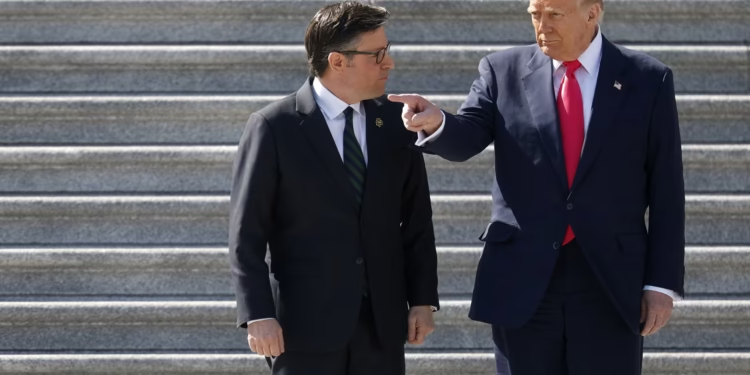President Donald Trump’s ambitious tax and spending bill, known as Trump’s tax bill, dubbed the “One, Big, Beautiful Bill,” is encountering significant resistance within the Republican Party. This internal discord threatens Trump’s tax bill passage and raises concerns about its potential impact on the U.S. economy and financial markets.
Key Points of Contention
1. Fiscal Conservatives Alarmed by Rising Deficits
The proposed legislation aims to make the 2017 tax cuts permanent, introduce new tax breaks, and implement spending cuts. However, the Committee for a Responsible Federal Budget estimates that the bill could add up to $5.2 trillion to the national debt by 2034. Fiscal conservatives, such as Representative Chip Roy of Texas, argue that the bill front-loads tax cuts while deferring spending reductions, potentially exacerbating the deficit if future cuts are not realized .
2. Medicaid Cuts Spark Opposition
Proposed reductions in Medicaid spending have drawn criticism from both conservative and moderate Republicans. Senator Josh Hawley of Missouri publicly opposed the Medicaid cuts, stating that slashing health insurance for the working poor is morally wrong and politically unwise .
3. SALT Deduction Cap Dispute
The bill proposes raising the State and Local Tax (SALT) deduction cap from $10,000 to $30,000 for couples earning less than $400,000 annually. However, Republicans from high-tax states like New York and California argue that this increase is insufficient. Representatives such as Mike Lawler of New York are pushing for a higher cap, threatening to withhold support for the bill unless changes are made .
4. Estate Tax Exemption Concerns
The bill includes a provision to increase the federal estate-tax exemption to $15 million in 2026, benefiting the ultra-wealthy. Critics argue that this change favors a small fraction of estates and could exacerbate income inequality .
Market Implications
The uncertainty surrounding the bill’s passage has implications for financial markets. While the U.S. stock market has shown resilience, with indices like the S&P 500 and Nasdaq recovering from earlier declines, the potential for increased deficits and political gridlock raises concerns about long-term fiscal stability .
Notably, Moody’s Investor Service recently downgraded the U.S. government’s credit rating from Aaa to Aa1, citing rising government debt and widening fiscal deficits as key factors .
TradingBerg’s Perspective
At TradingBerg, we recognize that the proposed tax bill’s fate remains uncertain due to internal GOP divisions. Investors should closely monitor developments, as the bill’s provisions could have significant effects on various sectors and the broader economy. Key areas to watch include potential changes to tax policy, healthcare funding, and state-level tax deductions.






Just signed into 789betmpls to place my bets. Feeling good, hoping to score some big wins! Good luck to all the serious betters out there! Find out more 789betmpls.
Smart bankroll management is key, even with exciting platforms like jiliace ph app. Seeing localized options like GCash & PayMaya is a great sign of a player-focused approach – responsible gaming first, always!
Heard about rainbetrun. Seems different, I’m curious to learn. Visit them now: rainbetrun
Need to quickly login via vipjililogin, hope there will be some exclusive offers today! Check it out for yourself: vipjililogin
Downloading vn68apk now. Fingers crossed it’s a good one. Get yours and try to win here: vn68apk